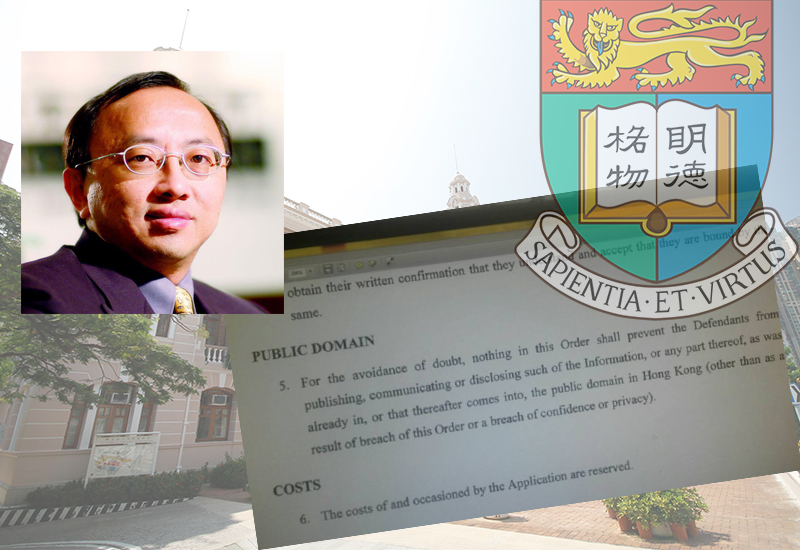A law scholar has said that the media can continue to publish two recordings of a governing Council meeting of the University of Hong Kong (HKU) broadcast by Commercial Radio last week, as a court injunction granted to HKU on Friday includes a public domain clause. The news comes as local media unions criticised HKU’s decision to apply for the gagging order.
The two recordings were of speeches made by Council members Arthur Li Kwok-cheung and Leonie Ki Man-fung, during a controversial session on September 29 in which the governing body rejected the appointment of liberal law scholar Johannes Chan Man-mun as pro-vice-chancellor of the university.

HKU issued a statement on October 30 stating that a court order had been granted and any recordings or documents related to meetings of the Council must not be published. HKU Council chair Edward Leong Che-hung told local media that the purpose of the order was to “protect the dignity of HKU.”
Cheung Tat-ming, a principal law lecturer at HKU, posted a section from the order on social media on Sunday night: “There is a public domain exception which unfortunately is not mentioned in HKU’s press statement issued on Friday,” he wrote.

An extract from the order posted online:
[mks_tabs nav=”horizontal”]
[mks_tab_item title=”Public Domain”]
For the avoidance of doubt, nothing in this order shall prevent the defendant publishing, communicating or disclosing such of the information, or any part thereof, as was already in, or that thereafter comes into, the public domain in Hong Kong (other than as a result of breach of this Order or a breach of confidence or privacy)
[/mks_tab_item]
[/mks_tabs]
Cheung said on a radio programme on Monday that other media organisations which have not received the legal documents can continue to broadcast the two recordings already in the public domain. They do not need to take down the recordings from the internet if they uploaded them before the injunction was granted.
Commercial Radio can also continue discussing the incident on their programme, but it could cause a problem if the original recordings are broadcast again in the future, he added.
The approval of the injunction will be heard in court on Friday.

Commercial Radio issued in a statement on Monday: “The matter is now being handled by our lawyers. We will make the most appropriate arrangement as soon as possible; As the matter has entered the judicial process, it is not appropriate for us to comment further for now. Commercial Radio will defend press freedom, freedom of speech and the public’s right to know, and will protect any news source.”
Unions hit back
The Hong Kong Journalist Association (HKJA), together with six other media unions and organisations, including those of RTHK, Next Media and Ming Pao, will be protesting the decision at HKU on Monday, HKJA Chairperson Sham Yee-lan told local media.
They will also start an online petition to demand HKU withdraw the application of the injunction order. They urged reporters, media workers, journalism teachers and students to sign the petition.
On Sunday, HKJA sent a letter to HKU requesting it to provide information on its application for the injunction, including its grounds for making the application, its written submissions to the court and all the supporting documents lodged.
“[P]ublication of confidential information in order to expose injustice and corruption to protect public interest has always been, and is, the duty of every journalist and media institution.”
“Seeking an unprecedented wide coverage, the injunction will not only restrict journalistic works on the council events of HKU but also set a daunting precedent on the protection of press freedom which is enshrined in the Basic Law.” the letter read, “As the largest independent press union, the Association is obliged to study the possibility of contesting HKU’s injunction application in court.”
HKU responded in a statement that: “The University of Hong Kong is, has been, and will continue to be a place where freedom of expression, opinion and thought are respected, valued and promoted… The legal action has been brought to protect those freedoms.”
